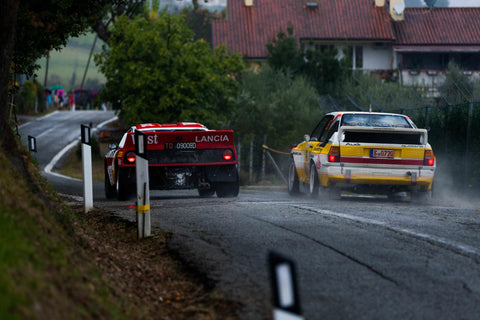In the 80s, one of the peak rivalries of rally history unfolded right in the middle of the mythical Group B era. Two unlikely foes went to battle: Volkswagen-backed Audi with its cutting-edge technology against small but experienced Lancia with a shoestring budget and riding on the back of the Stratos' previous success.
But what exactly happened?

Audi, From Family Sedans To Rallying.
Audi had been tinkering with 4x4 drivetrains since the 70s, eventually realizing their potential for rally racing. There was just a slight problem. According to the 1979 FIA motor racing rule book, 4WD cars could not be admitted in rallying.
To find a way around this, Audi seized an opportunity at a meeting of the sports governing body in Paris. Back in the days, 4WD was found in lorries and military vehicles, not in sports cars, so the people at the meeting didn’t bat an eye and catered to Audi’s request. Enter ‘Group B’, also known as the golden era of rallying. In 1982, Audi developed the first 4WD car for rallying, the ‘Quattro’. With a huge advantage in grip and traction on any surface, Audi went on a winning streak wherever they went, ultimately winning the 1982 world championship.

Lancia, The Search For A Successor For The Mighty Stratos.
In 1983, everyone was blowing their team budget trying to develop 4WD systems to rival Audi's Quattro with moderate to no success. On the flip side of the coin, there was Lancia. With the budget of a minor league football team, a known playboy as team boss - Cesare Fiori - and Walter Röhrl, and a driver who was more interested in doing what he wanted than in winning rally titles. The result was the ‘Rally 037’, a lightweight, mid-engined RWD car with a 2.1-litre inline-four engine good for 305 HP at 8,000 RPM.

How Did It Play Out On The Tracks?
First round, Monte Carlo. The snowy conditions were less than ideal for the mid-engined rear-wheel drive 037, putting Audi head and shoulders above the competition. But while others were busy setting up their cars for the slippery conditions, Lancia was busy buying all the salt they could get their hands on and sprinkling it on crucial turns. By the time the 037 went by, all the snow was melted and Lancia was able to secure first and second place, leaving everyone scratching their heads, wondering how they pulled it off.
The next round was Sweden. Lancia didn't even bother to show up, realizing there wasn't enough salt in the world to melt that much snow. Audi came through with a 1-2 victory, a feat they were able to repeat in the next two stages in Portugal and East Africa. Corsica was next, where the dry tarmac proved perfect for the 037, securing the first four positions on the board with Audi retiring its Quattros due to mechanical failures. At the Acropolis, a stage known for demolishing even the toughest cars, the lightweight Lancia made a surprise win against the reliable German that couldn't even finish. The competition was tight in the next two rounds, New Zealand and Argentina, with both teams scoring good points. Next up was Finland, with an easy win for Audi. Lancia's main driver was a no-show, with Röhrl famously saying, “If I liked flying, I would’ve been a pilot,” in reference to the huge number of jumps in Finnish tracks.

Lancia's Last Shot.
With only two championship rounds left - Italy and the RAC - Lancia decided to go all-in on their home turf. But conditions at San Remo proved tricky. The track was so dusty that drivers were unable to deliver good performances. Lancia, being Lancia,
faked technical issues at the start of each stage, trying to get a less dusty run than the competition but with little success. Enter Walter Röhrl, the driver that raced for himself, not for titles. In a race that became all about driver skill, the German gave a career-changing performance. In perfect man-machine symbiosis, Röhrl's precision and skill delighted the crowds and won 33 out of 58 stages, helping Lancia secure the top three spots.
Martini 'David' vs 4WD 'Goliath'.
In the end, Lancia beat Audi by the slimmest of margins with 118 to 116 points. It would be the last and only time a two-wheel-drive car beat a four-wheel-drive car. The game had changed forever. But for one last time, the scrappy underdog came out on top and made history.



